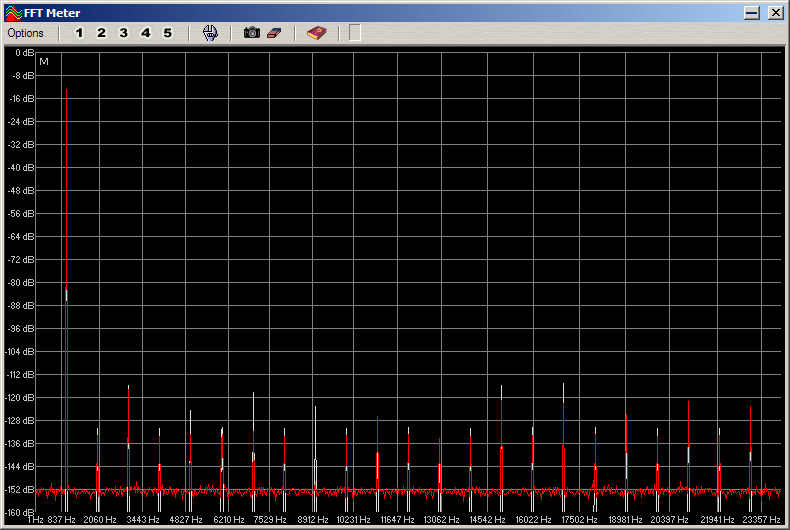Glassman said:..and cause an ugly truncation distortion due to undithered requantization
INFACT
The idea is to split the 20 bit data word in 2 words of say 10 bit , one for each 16 bit dac ....
but I need some help to realize it in practice ....

Glassman said:..and cause an ugly truncation distortion due to undithered requantization
Thats only 4 bits lopped off. There are those that send 24/96 data to the TDA1543 and swear it is the greatest thing ever.
Why not just get a modern 24 bit pcm dac like the Ti PCM1794 or PCM1798 or the Analog Devices 24 bit AD1852 sigma delta dac?
The results are liable to be way better with any one of these than with two ancient 16 bit dacs used with a 20 bit word.
The point about calibrating the two is also valid, and I think this will cause a huge linearity issue..
The two chips are unlikely to have identical drift so it is unlikely that the two will hold their calibration over time and temperature either. Such things are regularly done in dc ATE applications, but are subject to frequent calibration and checking. AC I think would open a whole new can of worms.
Edit: fix typo
The results are liable to be way better with any one of these than with two ancient 16 bit dacs used with a 20 bit word.
The point about calibrating the two is also valid, and I think this will cause a huge linearity issue..
The two chips are unlikely to have identical drift so it is unlikely that the two will hold their calibration over time and temperature either. Such things are regularly done in dc ATE applications, but are subject to frequent calibration and checking. AC I think would open a whole new can of worms.
Edit: fix typo
Yes of course , that is true if I can use a 24 bit dac and start truncating bits to hear the effects .rfbrw said:Digital filters often perform straight truncation. There is no way the the sonic effects of a 2 bit truncation are as bad as a 4 or 8 bit truncation.
The problem is that 18, 20 or 24 ( or more ) bits into a 16 bit dac simply doesn work properly .
Yes Ok thats right . But I am getting rid of the AK 4365 (20 bit sigma/ delta) for a multibit DAC for personal taste reasons . I should try to find an old 20bit AD1862 , but I think it comes down to space matters inside the little DVD player .kevinkr said:Why not just get a modern 24 bit pcm dac like the Ti PCM1794 or PCM1798 or the Analog Devices 24 bit AD1852 sigma delta dac?
Edit: fix typo
EDIT :
.... more over ( and correcting myself ) the dvd player outputs I2S in Philips format , while both PCM and AD think want Sony format . SO ...
rfbrw said:Digital filters often perform straight truncation. There is no way the the sonic effects of a 2 bit truncation are as bad as a 4 or 8 bit truncation.
such filters should be prosecuted by the law.. and yes, 2, 4 or 8 bits of truncation - no difference, it only depends on the level at which the truncation happens, not on the number of bits you're loosing..
stefanobilliani said:
but I think it comes down to space matters inside the little DVD player
Unless you plan to make a PCB using chipscale devices and the like, space will always be an issue. You might as well opt for a 20 bit dac and the logic to split the I2S signal.
Glassman said:
such filters should be prosecuted by the law.. and yes, 2, 4 or 8 bits of truncation - no difference, it only depends on the level at which the truncation happens, not on the number of bits you're loosing..
In this context level is irrelevant, it is a straight hardware truncation and 8 bits will be worse than 2.
the amplitudes of harmonics due to truncation are the same when going from 24b to 16b and from 20b to 16b..rfbrw said:In this context level is irrelevant, it is a straight hardware truncation and 8 bits will be worse than 2.
in terms of amount of information lost, 8b is of course more than 2b, the distortion products resulting from truncation are nevertheless equivalent.. prove me wrong, I'd like to know where I'm wrong in my reasoning..
- Status
- This old topic is closed. If you want to reopen this topic, contact a moderator using the "Report Post" button.
- Home
- Source & Line
- Digital Source
- Using 20 bit data with a pair of old 16 Bit DAC
